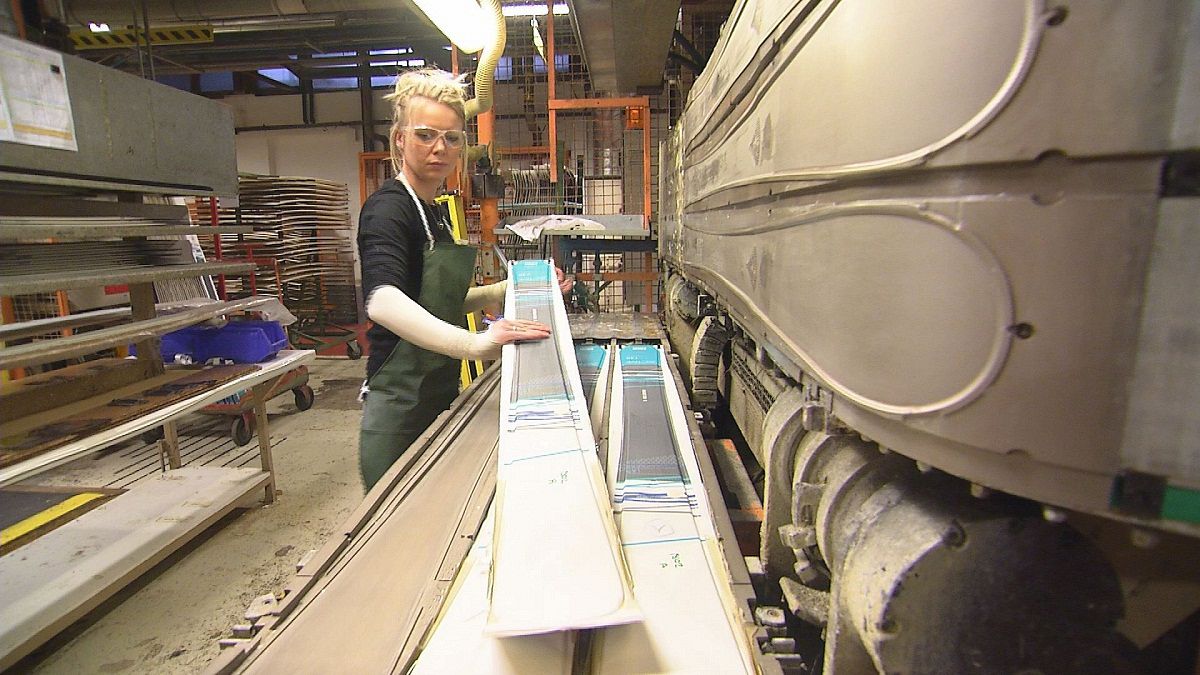Nestled in the Chamonix valley in the French Alps is the main factory of ski-maker Rossignol.
Struggling a few years ago, the site was revitalised by the company’s decision to return production to France from its plant in Taiwan. Not only were jobs saved, but new staff were taken on.
“We can develop more skis. It’s great for the factory’s future. Very encouraging,” said Anthony Girard a Rossignal product line manger
“The fact the skis are made in France, that in itself enhances the product,” said Encarni, a screen printer at the plant.
Moving production closer to their prime markets is an increasing trend among European businesses.
Rossignol still makes several products in Asia and eastern Europe, but the repatriation of ski manufacturing has been profitable.
For CEO Bruno Cercley, the advantages are clear: “Making things on the other side of the world that you then repatriate is very expensive in transport costs, and you lose a lot of flexibility. The big market is here in Europe and being close to our markets, and to be able to get to your market quickly and to react gives you a real competitive edge.”
With around four million industrial jobs lost and a 10 percent drop in in production in Europe since 2008 European businesses are just beginning to bring their operations home.
In the heart of the Jura mountains is the so-called ‘valley of glasses’
In Morez, some local companies have held out against offshoring.
Created in 1886, the firm Albin Paget is one of the last factories in the valley where frames are made entirely in-house.
That is a major asset in the eyes of distributors and fashion brands who buy them under licence.
The made in France label and the ability to quickly re-supply clients are big advantages in the battle with the giants of the sector
The frames cost a little more than those made in Asia, but customers are still buying, as the CEO, Jean-Michel Werling, stresses: “We can’t compete with Chinese wages. But the French design, the made-in-France label and our market responsiveness are a solid foundation and allow us to continue to exist in the market. We guarantee quality, there are very few product returns – less than one percent. That’s quality guaranteed.”
Even if the business has projects in development, it is suffering from the disappearance of specific knowhow, thanks to the foreign outsourcing trend in the industry.
“We’ve a real skills shortage. With few factories left it’s really hard to find qualified people for all the tasks the we need done here,” said Werling.
Like many employees Bernard has been working at the factory for more than 30 years. As well as making prototypes he hand paints metal frames.
“It’s not complicated, but it requires knowhow, and we don’t learn that at school,” he said. “Painters are increasingly rare in Morez. Maintaining traditional skills is very important for the future, for quality production. Without quality there’ll be no jobs tomorrow,.”
Building on quality and maximising the niche market is what characterises European business that choose not to relocate abroad.
But this can also be a major challenge, as the experience of one luxury lingerie workshop shows. It started up a year ago in the wake of the collapse of the French lingerie maker Lejaby.
The brand’s relaunch 2 years ago failed to prevent the loss of many jobs.
Out of the ashes of Lejaby Les Atelieres was born. Under the stewardship of businesswoman Muriel Pernin and a few ex-employees, and with cash form private investors, the workshop created around 30 jobs.
At the time of our visit, the order book was full, but the company admitted it struggled to deliver on time because the production model was not completely adapted to its niche market.
Most of their cashflow had gone on research on improving the manufacturing process.
“Production overseas means moving the big product lines, but we don’t think about maintaining the smaller product lines,” said Pernin. “In the luxury market we don’t make 30,000 pieces, we make 500 or 1,000. I would stress there is a niche market for the small scale products but for that you need to re-think the organisation.”
But the future remains uncertain.
Their search for new investors was dealt a hammer-blow by the banks’ refusal to support it.
As this report was going on line,Les Atelieres was preparing to announce its liquidation. Starved of funds the dream the staff believed in just weeks earlier had all but died.
Talks had resumed with the banks to save a business that is not lacking talent, clients, or projects, including the launch of its own brand.
But, in a globalised market Les Atelieres’ story shows just how hard and painful it is for a new and fragile business model to break through in Europe.
